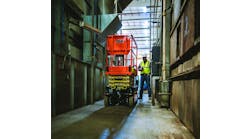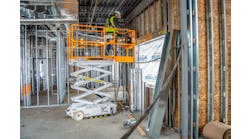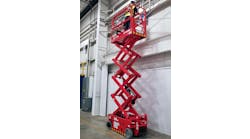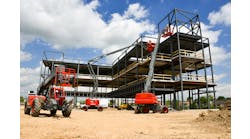United Rentals CEO Michael Kneeland believes the recovery is beginning and the rental industry should see some improvement in nonresidential construction in the latter part of 2010. He recently spoke with RER’s Michael Roth about his company’s outlook for the year ahead.
RER: Can you tell us, in a nutshell, what you expect business to be like in 2010?
Kneeland: The overall economy appears to be in the early stages of a recovery, which means that we are beginning to head in the right direction. Historically, residential construction leads the way, followed by other segments six or more months down the road. Based on that, we expect to see private non-residential construction pick up in the back half of 2010 as the recovery expands. Public non-residential work is likely to get an earlier bounce from stimulus money.
We are braced for another challenging year, but one that should benefit from the transformation of the business that began about 14 months ago. Our focus is on continuing to grow our National Accounts program, especially industrial customers, and on further improving customer service to customers of all sizes. About six months ago, we began measuring 19 key service metrics at all of our branches using a Customer Focus Scorecard. These are metrics like on-time delivery and service response time. We are investing for the future to drive efficiencies and to expand customer services. Our employees are committed to distinguishing our service from competitors, and the progress they’re making is impressive. Their commitment has helped us win many new customers. We know that we’re on the right path, and that’s very exciting to us.
Do you have any reason to expect business to ‘turn around’ before 2011?
Typically, modern recessions have been followed by V-shaped recoveries, but this recession has its own characteristics that don’t appear to support that pattern. Instead, we’re planning on a recovery that bumps along the bottom for a while. But if it’s V-shaped, we’re fully prepared for a faster recovery and the acceleration in demand for our services.
The key to a rebound in construction is a more accommodating credit market. Construction depends on the availability of credit, and over the past year or so, the credit markets have been very tight, making it nearly impossible for contractors to line up the financing they need for projects. That has to change, and should in time.
Even now, there are pockets of opportunity — some of them substantial. Because of our trench safety operations, United Rentals is strongly positioned to benefit from stimulus spending, which should pick up in 2010. We are tracking every stimulus project and assigning a sales person to pursue rental opportunities. In addition, our branch network is spread across all 10 Canadian provinces, where the economy has generally fared better than in the U.S. through this downturn. Canada has been more effective at putting its stimulus funding to work quickly on various infrastructure projects.
What do you expect from the economy in 2010 — in your market areas and overall in the U.S. and how it pertains to our industry?
Most leading economists believe that the recession is over, but our industry will have to wait a bit longer before it sees the tangible benefits of a recovery. We have created the necessary financial flexibility through cost savings and the prudent management of our debt maturity profile, and we feel confident of our positioning for the recovery. That may not be the case for all of our competitors.
On a market-by-market basis in the U.S., we benefit from our geographic footprint in 48 states. Despite closing more than 100 branches over the past 18 months, we have not exited any major markets. Right now we have a process underway to identify growth targets: markets where we believe that a rebound will take place in infrastructure projects and education and health care facilities. We expect these sectors to recover more quickly than commercial construction, which is currently burdened by a lot of vacant space. Our expectations for localized market recoveries are more sector-based than geography-based.
Any strategies you can share about how you will survive and prosper in 2010?
I am most proud of how our people have responded to the economic challenges. We have asked a great deal of them, and they have responded with determination and hard work. With their help, we have been able to take a tremendous amount of excess costs out of the business, and we expect that many of those costs will remain out when the construction cycle turns in our favor.
At the same time, we have intensified our commitment to customer service. We firmly believe that service excellence is the key to attracting new customers and winning a greater share of business from current customers — in fact, we’ve already seen some proof of that. The critical strategy for surviving and prospering in a tough environment is to build a stronger bond with your customers, showing them that you value their business and are ready to go beyond the norm for them. We are creating a better customer experience, one that is making a difference now, and will continue to set us further above the pack in the future.





